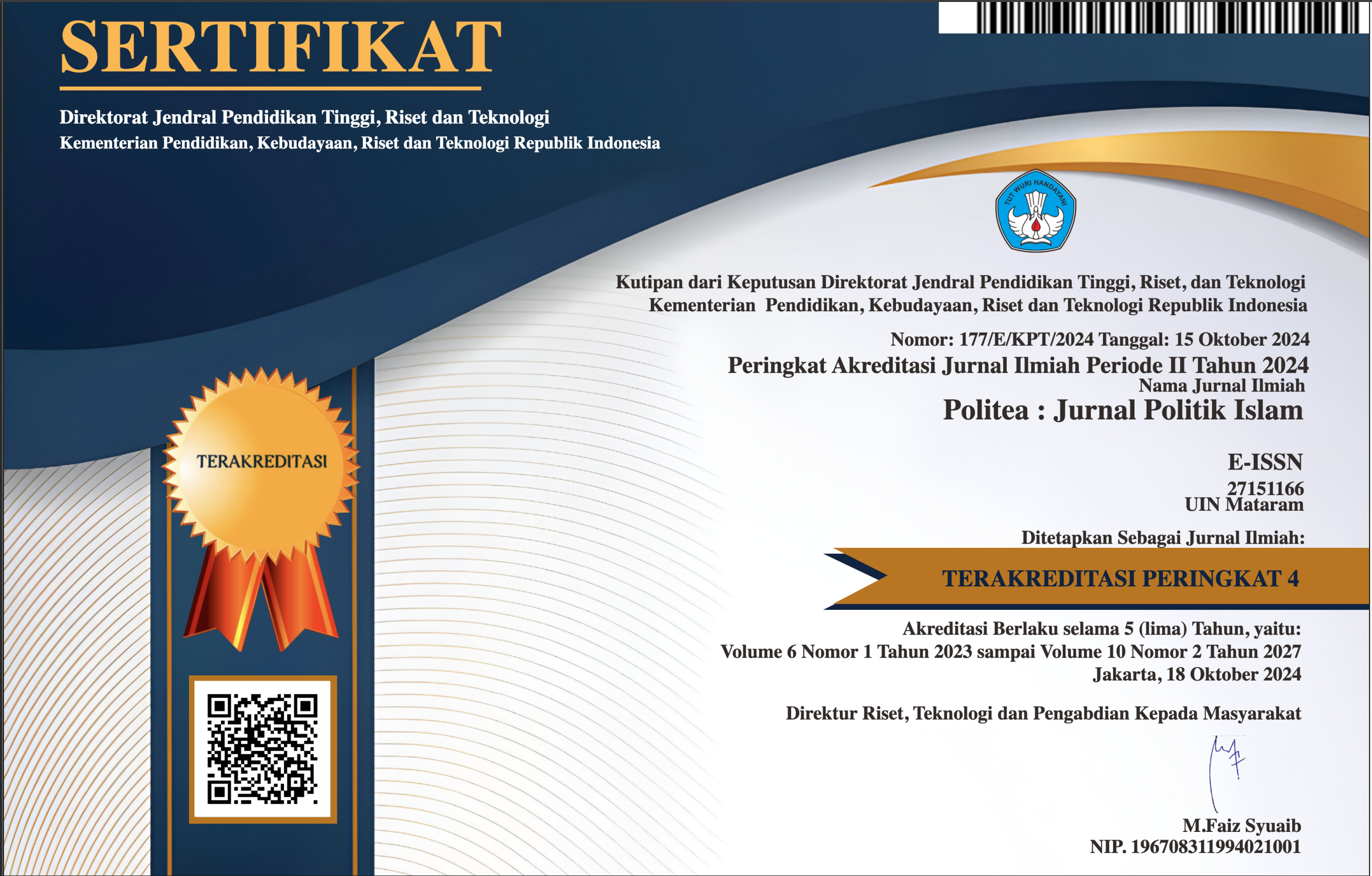THE UNITED STATES AND CINO-PAK STRATEGIC IMPERATIVE IN AFGANISTAN
Pentingnya Strategi Negara-Negara Perserikatan dan Cina-Pakistan di Afganistan
DOI:
https://doi.org/10.20414/politea.v6i1.6904Keywords:
United States, Cino-Pak, Strategic Imperative, AfghanistanAbstract
This study aims to explain the importance of the strategy that must be taken by countries that are directly involved in war, such as the United States and Afghanistan. On the other hand, this strategy should also become an option for dominant countries in the region, such as China and China-Pakistan. This study tries to use Joseph Nye's theories/concepts, namely hard power, soft power and smart power. Soft power and smart power have been proposed for their application to try to end the violence in Afghanistan when the theory/concept of hard power has not succeeded in making Afghanistan peaceful. The methodology used in this study is explanatory-literary research, which tries to decipher the problem of the theme above based on the literature by explaining the relationship between phenomena recorded through various books, journals and reviews and what is widespread in online media. The result is then the need for a new strategy to try to reconcile the conflict/war in Afghanistan to be taken by the countries involved as well as countries that have a dominant role in Afghanistan such as China and Pakistan as the closest (neighboring) countries. The theoretical implication is that Joseph Nye's theory of soft power and smart power provides a promising solution in the future, even though this theory dates back to 2004. While the practical implications are expected that countries involved in the war and countries that have a dominant role can take this theory as their policy choice to end the conflict in Afghanistan
Downloads
References
Buku
Nye Joseph, Turbulent Peace The Challenges of Managing International Conflict, United State Institute of Peace Press, 2001, Washington DC.
Barston R.P., Modern Diplomacy, 1989, Longman Group UK and Longman Incorporate; New York.
Gray Jerry D. American Shadow Government Pemerintah Bayangan Amerika, Sinergi Publishing Kelompok Gema Insani, 2005, Jakarta.
Jurnal
Joseph S. Nye, “Smart Power and the War on Terror”, Asia- Pacific Review, Vol 15, No 1, 2008, p. 6.
Yoga Suharman dan Sugiarto Pramono, Strategi Kebangkitan Ekonomi Tiongkok dan Pendekatan Long Cycle Transisi Kekuasaan Politik Dunia, Jurnal SPEKTRUM, Vol 18 No. 1, 2021
Muhammad Faizal Alfian, Transisi Cina Terhadap Ekonomi Global: Internasionalisasi Dalam Perspektif Pembangunan Model China Dan Dinamika Regional, Dalam Review Hubungan International 2020.
Hurun’in Irza, Tantangan Bina Damai: Kegagalan Demokratisasi Pasca Konflik Sipil Di Afganistan. Jurnal Transformasi Global volume 3, Nomer 1. 2010
Haris Umiyati, Penyelesaian Konflik Afganistan-Pakistan:Sebuah Pendekatan Rekonsiliasi, Jurusan Hubungan Internasional Universitas Hasanuddin, 2016.
Bu?ra Sar? (Universitas Gazi - Universitas Bilkent), Ismail Erkam Sula (Universitas Bilkent), An Analysis On The Concept Of Smart Power: Its Application On Turkish Foreign Policy, Paper prepared for the ISA Annual Convention, Toronto 2014, Wednesday, March 28th, 2014 08:15 AM, Panel Title: "Turkey's Use of Soft Power"
Internet
https://hmj-hi.umm.ac.id/id/pages/ir-fact-and-issue-2-7276/belt-and-road-initiative-sebagai-strategi-konektivitas-china-dalam-globalisasi.html, Akses tanggal 02 Februaru 2023
Watson Institute, Stanford University, Afganistan: 16 Tahun, Ribuan orang meninggal dan tidak jelas kapan akhirnya, 2017 sebagaimana dikutip repository UMY. Akses 30 Januari 2023.
Downloads
Published
Issue
Section
License
Copyright (c) 2023 Politea : Jurnal Politik Islam

This work is licensed under a Creative Commons Attribution-ShareAlike 4.0 International License.







